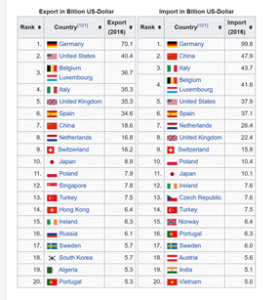
6 Wealth-Building Lessons from Khadijah (RA) Every Muslim Should Know
03 December 2025 8 min read


Ibrahim Khan
Co-founder
9 min read
Last updated on:
Following the recent attacks in France, President Macron and France have taken an increasingly belligerent approach towards the French Muslim community and Islam.
The French state has been shutting down and raiding Islamic schools, centres and mosques as well as making life extremely difficult for practicing Muslims in France. This is of course in the backdrop of the French state’s historic veil ban, the hijab ban from public institution jobs, and generally muscular secularism.
There has also been widespread support and solidary for, and re-publication of, the offensive cartoons of the Prophet (PBUH) that lie at the heart of this recent furore.
Presidents Erdogan and Macron have also engaged in a war of words, which ultimately culminated in Erdogan calling for a boycott of French products.
This call has also been echoed by a number of leading Muslim figures such as Sh. Omar Suleiman:
JTNDYmxvY2txdW90ZSUyMGNsYXNzJTNEJTIydHdpdHRlci10d2VldCUyMiUzRSUzQ3AlMjBsYW5nJTNEJTIyZW4lMjIlMjBkaXIlM0QlMjJsdHIlMjIlM0VUaGUlMjBmcmVlZG9tJTIwdG8lMjByZWplY3QlMjB5b3UuJTIwJTNDYSUyMGhyZWYlM0QlMjJodHRwcyUzQSUyRiUyRnR3aXR0ZXIuY29tJTJGaGFzaHRhZyUyRmJveWNvdHRmcmFuY2UlM0ZzcmMlM0RoYXNoJTI2YW1wJTNCcmVmX3NyYyUzRHR3c3JjJTI1NUV0ZnclMjIlM0UlMjNib3ljb3R0ZnJhbmNlJTNDJTJGYSUzRSUyMCUzQ2ElMjBocmVmJTNEJTIyaHR0cHMlM0ElMkYlMkZ0LmNvJTJGRFk3M2dObUhKUSUyMiUzRXBpYy50d2l0dGVyLmNvbSUyRkRZNzNnTm1ISlElM0MlMkZhJTNFJTNDJTJGcCUzRSUyNm1kYXNoJTNCJTIwRHIuJTIwT21hciUyMFN1bGVpbWFuJTIwJTI4JTQwb21hcnN1bGVpbWFuNTA0JTI5JTIwJTNDYSUyMGhyZWYlM0QlMjJodHRwcyUzQSUyRiUyRnR3aXR0ZXIuY29tJTJGb21hcnN1bGVpbWFuNTA0JTJGc3RhdHVzJTJGMTMyMDc3NTQ3NjIyNzU0MzA0NSUzRnJlZl9zcmMlM0R0d3NyYyUyNTVFdGZ3JTIyJTNFT2N0b2JlciUyMDI2JTJDJTIwMjAyMCUzQyUyRmElM0UlM0MlMkZibG9ja3F1b3RlJTNFJTIwJTNDc2NyaXB0JTIwYXN5bmMlMjBzcmMlM0QlMjJodHRwcyUzQSUyRiUyRnBsYXRmb3JtLnR3aXR0ZXIuY29tJTJGd2lkZ2V0cy5qcyUyMiUyMGNoYXJzZXQlM0QlMjJ1dGYtOCUyMiUzRSUzQyUyRnNjcmlwdCUzRQ==
Done effectively, boycotts can literally bring down regimes and end apartheids. But the problem with these calls of boycott are that they are not particularly effective if done in an unthoughtful way.
For example, many of the companies listed on the list above are food companies – and yet food and agriculture only constitute 2% of the French GDP[1].
And look at this breakdown of the France’s key trading partners[2].
The important point here is that there are no Muslim countries in the top ten and only two in the top 20. In other words, even if the entire Muslim world boycotted France, it’s not going to have a huge impact.
Muslims in Europe and the USA constitute around 5% of the population on average so our boycotting will likely have little to no impact.
The point is clear: boycotting needs to be strategic and focused.
So how do we show our displeasure at France’s actions? How do we make sure we protect the 10% Muslim population in France? How do we strategically target the areas of the French economy that France actually cares about?
In this article we dig into the economics behind this global boycott movement.
We explain:
Or, if you just want to skip to what we think you should be doing for this boycott – skip ahead to the conclusion at the end.
Really simply, a boycott is cutting economic ties in some way with a country. Most people think it just means not buying French cheese, but it can actually be much deeper than that.
It can include the following:
There are three broad and overlapping reasons why anyone would boycott another country:
Number 2 on that list is very easy to achieve. You kick up a big fuss, burn a few flags, and go after French cheese.
But (1) and (3) are the aims that are much harder to achieve but also much more effective.
Achieving (2) is fine – it can raise awareness of the issue and perhaps cause a political shift – but long-term it is more likely to make the protestor feel better about themselves rather than actually giving real food for thought to the relevant people in France.
This is an important point to keep in mind as France is not a monolithic entity.
Ideally we want to be boycotting those elements of the French population that are influential and voted for Macron’s La République En Marche Party.
We don’t want to overly target those segments of the economy that Muslims in France work in.
Let’s take each of the key levers we have to boycott with and assess their impact.
We stop buying certain French goods. That then means the demand for these products go down and they become cheaper. If no one buys them at that cheap price they need to be disposed of in the home market or destroyed.
This is primarily private direct investment into France via companies investing in France, or private equity and venture capital investments. It also includes public equity investing, but that is not so vital.
If foreign investment dried up it will gradually lead to a depreciation of the capital stock in France and reduce productivity.
Practically this means French companies would not be able to invest in latest technologies as effectively and that would mean they become less efficient compared to their counterparts. In the long-run this would make their products and pricing less competitive.
This would be a hugely impactful boycott and would bring France to its knees very quickly. This is because there are only a handful of large oil exporters globally – e.g. Saudi Arabia, Russia Iran and the USA. If Saudi Arabia and Iran pulled oil exporting to France, for example, that would be incredibly impactful.
However, it is such a high impact option that it would have severe geopolitical impact.
So, even if the Saudi and Iranian government were in theory supportive of making a point to France, it probably is not worth actually doing this as it would have long-term destabilising impacts that are very hard to predict and likely to not be favourable for Saudi Arabia or Iran.
The first thing we need to take into account is how the French economy is constituted.
France is a country primarily made up of the services sector (78.8% of the GDP) and the industrial sector (19.5% of GDP). This totals to 98.3% of the GDP. So if any boycott is going to be successful, it needs to focus hard on these sectors.
The second thing we need to focus on is where France has a competitive advantage; where French companies are actually leaders in their field. Here is a quick list we can use (ordered in terms of impact):
Thirdly, France is the world’s most popular tourist destination, so we should obviously stop going there on holiday. Not much chance of that right now anyway, but one to bear in mind for the future.
Fourthly, given the relatively limited impact we as a Muslim community can have on French economics given the table below, we should consider strategic focus on only a small group of companies rather than going after a bunch of them. Why?

In light of all the strategic considerations, we propose 3 key things we should all do/not do:
We should boycott the following large companies:
These are large prominent companies that many Muslims will have engaged with, purchase from, or are customers of. They stick in the mind as we see them all around us.
Of course, if you can boycott more you should. A fuller list is found here.
You should also be aware that most of these brands have a large range of subsidiary brands that you should be aware of. This is particularly applicable when it comes to the luxury brands. They own a vast range of brands in clothing, perfumes, cosmetics, jewellery and watches. Whenever you’re making a purchase from an upmarket brand – just do a quick Google. It’s the easiest way to check.
You should consider carefully which company you work for, or which companies you are applying to work for – and make sure they are not French companies.
I am not advocating quitting your job in protest overnight as I appreciate that is a pretty precarious position to put yourself in at this time.
But if you work for a French company I would sincerely urge you to explore your options elsewhere. And if you are applying, I would sincerely encourage you to not apply to the French companies.
There is a really important reason for this.
80% of the French economy is down to the services sector – and the fuel of the services sector is people and talent. The companies who can uncover the best talent win. That is why you see large corporates desperate to access the best talent at universities and supporting diversity. They know there is talent everywhere and the wider the net they can cast the better.
Don’t be part of that net. As being part of that net strengthens France.
True, Muslims are only 5% of the population in USA and Europe – France’s main trading partners. But if 5% of your workforce starts leaving, and you find that 5% of the applications are down – that has a much larger impact than just 5%. Because losing a worker isn’t just a matter of replacing them. It is also a matter of having to rework all the various workstreams that worker used to contribute or lead on.
This is a big one. Muslims have one thing going for us globally. We make up 25% of the world’s population. And if France is the number one tourist destination, then lopping off 25% of that is very significant.
Muslims are 9% of the population in France and we don’t want them to suffer of course. They are also relatively practicing with 70% observing Ramadan and becoming more practicing every year[3].
Muslims primarily live in cities, with 10-15% of the population in metropolitan areas being Muslim. They typically have struggled since they migrated to France and have low-income low-skilled jobs, particularly as French heavy industry has languished and automated (so cut jobs).
As a result , Muslims have almost double the national unemployment rate at 15%.
Most Muslims will work in construction, domestic services, automotive industries and service industries.
In our strategic list of companies to really focus on for the boycott, we have avoided these sectors.
If any boycott of France is going to be more than just posturing, it needs to be strategic. In our humble view, the way to be most strategic given the facts is:
Please share this article widely so we can be as impactful as possible with this boycott inshAllah.
Economic Effects of a Trade and Investment Boycott against South Africa, Author(s): Mats Lundahl. Source: The Scandinavian Journal of Economics , Mar., 1984, Vol. 86, No. 1 (Mar., 1984), pp. 68-83
https://www.ft.com/content/f372cbb8-4a96-11e7-a3f4-c742b9791d43
https://www.britannica.com/place/France/
https://www.brookings.edu/wp-content/uploads/2016/07/integratingislam_chapter.pdf
[1] https://www.britannica.com/place/France/Agriculture-forestry-and-fishing
[2] https://en.wikipedia.org/wiki/Economy_of_France#:~:text=France%20has%20a%20diversified%20economy,second%20in%20Europe%20after%20Germany)%2C
[3] https://www.reuters.com/article/us-france-muslims/french-muslims-becoming-more-observant-idUSL176050220080117

03 December 2025 8 min read

26 November 2025 6 min read

23 September 2025 4 min read
Leave a Reply